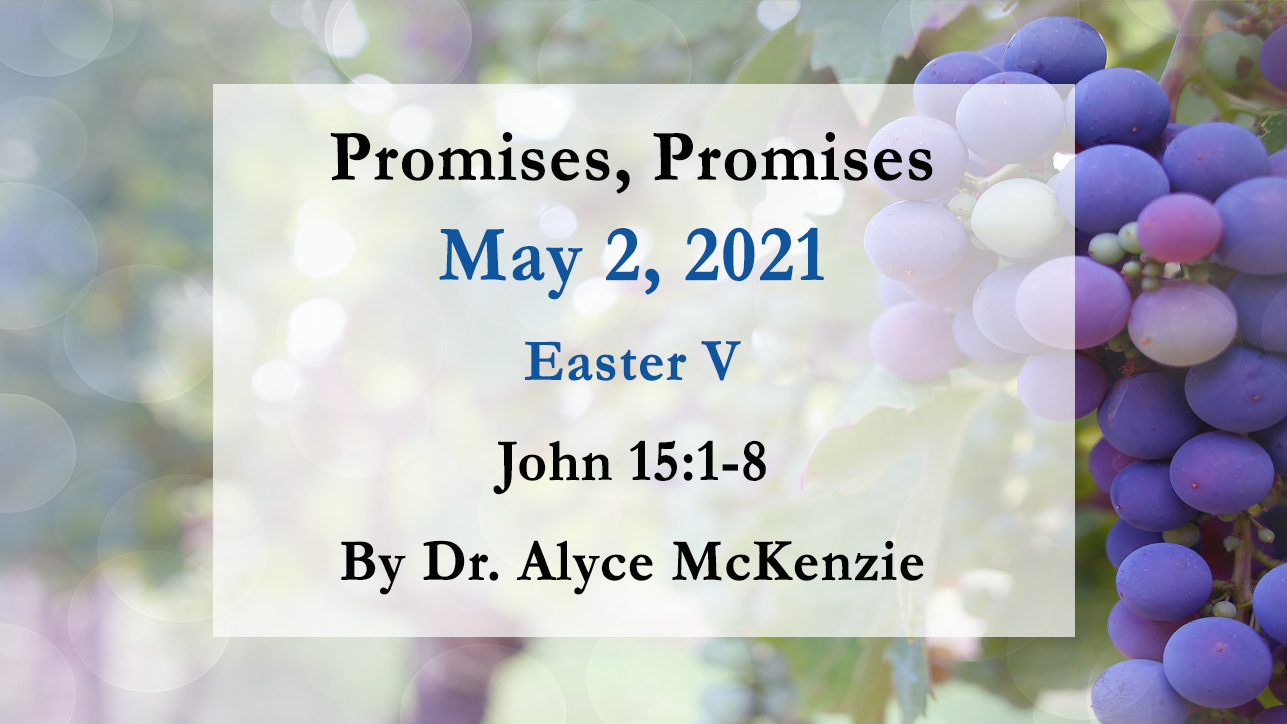Promises, Promises - Reflections on John 15:1-8
by Dr. Alyce M. McKenzie on Monday, April 26, 2021

Promises, Promises
Lively Lectionary Easter V John 15:1-8 May 2
One of the hymns on a recent Sunday at church was “O Jesus, I Have Promised.”
O Jesus I Have Promised to serve thee to the end;
be thou forever near me, my Master and my friend.
I shall not fear the battle if thou art by my side,
nor wander from the pathway if thou wilt be my guide.
O let me feel thee near me! The world is ever near;
I see the sights that dazzle, the tempting sounds I hear;
my foes are ever near me, around me and within;
but Jesus, draw thou nearer and shield my soul from sin.
O let me hear thee speaking in accents clear and still,
above the storms of passion, the murmurs of self will.
O speak to reassure me, to hasten or control;
O speak, and make me listen, thou guardian of my soul.
O Jesus, thou hast promised to all who follow thee
that where thou art in glory there shall thy servant be.
And Jesus, I have promised to serve thee to the end;
O give me grace to follow, my Master and my Friend.
The hymn was written in 1866 by John Ernest Bode, an Anglican clergyman serving a small parish near Cambridge, England. He had three children, a daughter, and two sons. On the occasion of their confirmation, he not only presided but also wrote this hymn especially for the occasion –– telling the children that the hymn included "all the important truths I want you to remember."
https://hymnstudiesblog.wordpress.com/2008/09/29/quoto-jesus-i-have-promisedquot/
He was right. It does. It would make a nice musical accompaniment for John 15:1-8.
In this passage John’s Jesus is saying: “I am the true vine. The Father is the vine grower. (15:1) As the Father has loved me, so have I loved you; abide in my love.” (15:9).
In Israel’s wisdom literature Wisdom is depicted as a vine or tree that bears the fruit of wisdom in human life. (The Wisdom of Jesus ben Sirach 24:17-21) In the synoptic gospels, Jesus draws on O.T. vine and vineyard symbolism in his parables: The Workers in the Vineyard (Mt 20:1-16), the Two Sons (Mt 21:23-32), and the Barren Fig Tree (Luke 13:6-9). Here in John’s gospel, Jesus promises to dwell in and with us and asks that we dwell in and with him. In other passages in the Last Discourse of John’s gospel, union with Jesus is described as belonging to the future (14:3, 20-22, 16:22). But in 15:6 the disciples are described as being already in union with Jesus. The emphasis is on remaining in that union.
“Those who abide in me and I in them bear much fruit” (15:5).
Jesus repeatedly uses the word “abide” to describe that relationship of the vine to the branches.
One of Jesus’ key appeals in John’s gospel is that the disciples “abide in me.” (meno) Also translatable as “Make your home with me,” or “Stick with me.” This sticking with, homing or abiding union with Jesus’ life results in the fruit-bearing of outreach and discipling.
The verb appears throughout the gospel At Jesus’ Baptism, John explains “I saw the Spirit descending like a dove, and it remained on him (1:32-34).
In Chapter 8:31 Jesus said to “the Jews who had believed in him,” “If you continue in (meno) my word, you are truly my disciples; and you will know the truth and truth will make you free.”
John Bode was right about his hymn “O Jesus I Have Promised…” It does contain the essentials needed for guiding our relationship with Jesus. It affirms Jesus’ promise to us. It awaits our promise to him.
Exegetical Notes:
Sources Consulted
Raymond Brown The Anchor Bible, The Gospel According to John
Melvyn R. Hillmer, “They Believed in Him: Discipleship in the Johannine Tradition,” in Patterns of Discipleship in the N.T. edited by Richard N. Longenecker.
